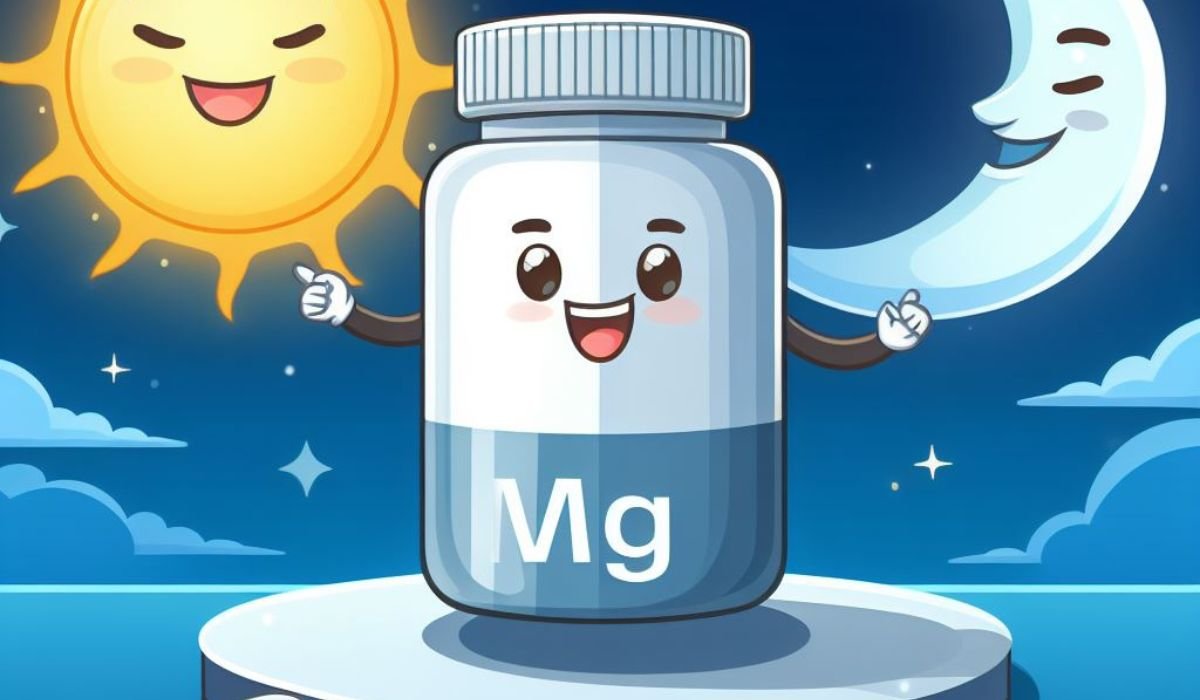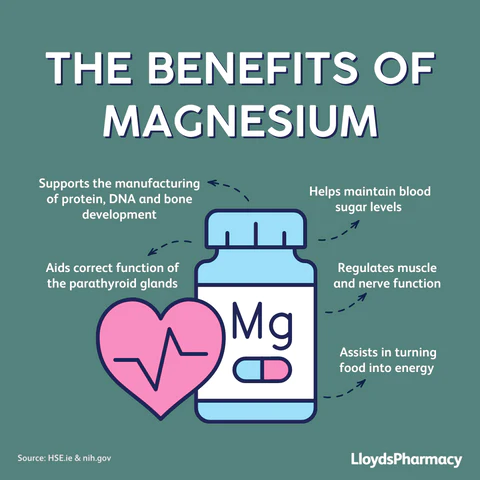What is the Best Time of Day to Take Magnesium Supplements?

If you’re considering taking magnesium supplements, you may be wondering what is the best time of day to take magnesium supplements?
In this article I am going to answer this exact question.
Important: Going through the article, you will notice linked numbers in brackets. These link to scientific research papers and other credible resources that fact check what I write. Feel free to follow them (links open in new windows) to verify everything. If I haven’t included a source or you found a mistake, contact me at hello@foodnourish.net.
While there is no one-size-fits-all answer to when you should take magnesium supplements, there are some factors to consider.
- For some people, taking magnesium supplements first thing in the morning may be easiest to remember and incorporate into their daily routine.
- On the other hand, taking magnesium supplements with a meal improves the absorption of the mineral.
- Finally, some types of magnesium supplements, such as magnesium glycinate, are better taken at bedtime.
Ultimately, the best time to take magnesium supplements may vary depending on your individual needs and preferences.
What is the best time of day to take magnesium supplements and why?
When it comes to taking magnesium supplements, there is no “best” time.
The best time of day to take them depends on your individual needs and preferences.
According to Healthline, magnesium supplements can be taken at any time of the day, as long as you take them consistently.
For some people, taking supplements first thing in the morning may be easiest to remember and add into their daily routine.
However, if you buy magnesium glycinate -which is proven to support better sleep, it is better, to take it at night with an empty stomach. [1] [2]
Magnesium can help promote relaxation and improve sleep quality, by regulating melatonin, a hormone that controls sleep-wake cycles, making it an ideal supplement to take before bedtime. [3]
It is also important to consider the timing of your meals when taking magnesium supplements.
Taking magnesium with food may help reduce the risk of side effects such as diarrhea. Healthgrades recommends taking magnesium supplements after eating or around mealtimes.
Additionally, it is advisable to avoid taking other medications in the 2 hours before and after taking magnesium supplements to prevent any potential interactions.
Overall, the best time of day to take magnesium supplements is subjective and depends on your individual needs and preferences. Some people may find it more effective to take them in the morning, while others may prefer to take them at night to improve sleep quality.
What is most important is not the time of the day you will be taking your magnesium, but being consistent in taking it.
Magnesium Absorption
One of the most important things to consider when taking magnesium supplements is how well your body can absorb them. This is called bioavailability, or how well your body absorbs it, is a crucial factor to consider.
Not all forms of magnesium are equally absorbed by the body.
Some magnesium supplements are more bioavailable than others, meaning they can deliver more magnesium to your cells and tissues.
For example, liposomal and sucrosomial magnesium supplements like of example, PUREDOSE Purality Health Liposomal Magnesium and MicroMag Sucrosomial Magnesium Powder are proven to increase magnesium absorption by protecting the mineral from being degraded in the digestive tract.
If you want to learn more about sucrosomial deliver technology click here.
On the other hand, some factors can hinder magnesium absorption, such as high doses of calcium, zinc, or iron, or certain medications like antibiotics or antacids.
To improve magnesium absorption, you should take your supplement with a meal that contains some healthy fats, and avoid drinking alcohol, coffee or tea right before or after.
Other factors that can hinder the absorption of magnesium are a diet high in sugar or phytic acid, certain medications, and some health conditions.
On the other hand, there are ways to enhance magnesium absorption.
Consuming magnesium-rich foods with vitamin D, B-vitamins, and selenium can help.
Also, maintaining a healthy gut environment is crucial as the majority of magnesium absorption occurs in the intestines. [4]
So, while magnesium supplementation can be beneficial, it’s essential to consider the bioavailability of the supplement and be aware of the factors that can affect its absorption.
The goal is to ensure that the body is getting the most out of the supplement.
Foods High in Magnesium
Consuming foods that are rich in magnesium is the best way to replenish your magnesium levels. After all, supplements are for… supplementing your food – right?
Anyway, here are some foods that are high in magnesium and readily available from your local store:
- Nuts and seeds: Almonds, pumpkin seeds, and chia seeds are all great sources of magnesium.
- Beans and legumes: Black beans, kidney beans, and lentils are all high in magnesium.
- Green leafy vegetables: Spinach, kale, and collard greens are excellent sources of magnesium.
- Whole grains: Brown rice, quinoa, and oatmeal are all high in magnesium.
- Dairy products: Milk and yogurt are both good sources of magnesium.
- Fruits: Bananas and avocados are both rich in magnesium.
- Other foods: Cashews and peanuts are high in magnesium.
Again, it is important to remember that eating whole foods that are high in magnesium is generally more effective than taking magnesium supplements. This is because your body is better equipped to absorb nutrients from whole foods.
Understanding Magnesium Supplements
When it comes to choosing a magnesium supplement, there are several forms to choose from. Magnesium citrate, magnesium threonate, magnesium lactate and so on.. But what each of it does?

The most common forms of magnesium supplements include
- magnesium citrate
- magnesium glycinate
- magnesium chloride
- magnesium oxide
- magnesium aspartate.
The other four, not so common forms are:
- magnesium sulfate
- magnesium lactate
- magnesium taurate
- magnesium threonate
Each of these forms has different properties and benefits.
Just for your information, the only magnesium supplements that have seven forms and five forms of magnesium in a single pill are Bioptimizers Magnesium Breakthrough and Perpetua Life Magnesium Gummies respectively.
Magnesium citrate is one of the most popular forms of magnesium supplements. It is highly absorbable and can help with constipation.
Magnesium glycinate is another highly absorbable form of magnesium that is gentle on the stomach and can help with anxiety and stress.
Magnesium chloride is a form of magnesium that is often used in topical applications, such as magnesium oil. It can also be taken orally and is highly absorbable. Magnesium oxide is a less absorbable form of magnesium that is often used to treat constipation. It is also commonly found in multivitamin supplements.
Magnesium aspartate is a form of magnesium that is often used by athletes to improve performance. It is believed to help with muscle recovery and growth.
When choosing a magnesium supplement, it is important to consider your individual needs and preferences. Some forms of magnesium may be more effective for certain conditions, while others may be better tolerated by those with sensitive stomachs.
It is also important to note that taking too much magnesium can cause side effects such as diarrhea, nausea, and stomach cramps – so, don’t overdo it.
Health Benefits and Risks

Benefits of Magnesium Supplements
Magnesium is an essential mineral that plays a vital role in many bodily functions, including energy production, heart health, and blood sugar control.
One of the most significant benefits of magnesium supplements is improved sleep.
According to Good Housekeeping, taking magnesium (especially magnesium glycinate) before bed can help you fall asleep faster and stay asleep longer.
Additionally, magnesium supplements have been shown to lower blood pressure, improve blood sugar control in people with diabetes, and even help alleviate symptoms of depression. [5] [6]
Potential Side Effects
While magnesium supplements can be beneficial, they can also cause adverse effects – if you overdo it.
The most common side effects of magnesium supplements include nausea, diarrhea, and vomiting. [5]
These symptoms typically occur when you take too much magnesium at once, so it’s important to follow the recommended dosage on the supplement label.
I mean, why wouldn’t you?
In rare cases, magnesium supplements can cause more severe adverse effects, such as low blood pressure, irregular heartbeat, and difficulty breathing. [7]
Interactions with Medications
Magnesium supplements can interact with certain medications, including antibiotics, diuretics, bisphosphonates, and proton pump inhibitors.
These interactions can reduce the effectiveness of the medication or increase the risk of adverse effects. If you’re taking any medications, talk to your doctor before taking a magnesium supplement.
Magnesium Deficiency
Magnesium deficiency is very common, and it can lead to a variety of symptoms, including muscle weakness, lethargy, and insulin resistance.
If you’re not getting enough magnesium from your diet, go buy a magnesium supplement right now.
Check what renowned Dr. Bryan Ardis has to say about magnesium and magnesium deficiency.
Frequently Asked Questions
Final Take
To summarize, there is no better time of the day to take your magnesium supplement.
The best time of day to take magnesium supplements depends on your individual needs and preferences. However, there are a few general guidelines that you can follow to optimize your magnesium intake.
- It is recommended to take magnesium supplements with food to enhance absorption and reduce the risk of stomach upset.
- If you are taking magnesium glycinate for better sleep, prefer taking it before bed with an empty stomach.
- Magnesium may interact with certain medications and other nutrients such as iron and calcium. Keep that in mind.
- If you are not going to buy a liposomal magnesium or sucrosomial magnesium for enhanced absorption, I recommend buying on that is coupled with Vitamin D. Vitamin D helps with absorption.
Finally, eating magnesium-rich foods into your diet and taking supplements as needed is a beneficial way to support your overall health and well-being.
Organic Matcha Green Tea Powder, 1 Pound
- Micro Ingredients Organic Matcha Tea Powder, Pure Matcha Powder Green Tea, 1 Pound, Culinary Grade and Authentic Japanese Origin.
- Best Superfood – Matcha is Rich in Antioxidants and is a Great Source of Natural Energy and Mental Clarity.
- Rich in Caffeine, Gradually Aids with Digestion, Healing, Cleansing and Contains Natural L-Theanine, Provides Good, Clean Energy.
⭐⭐⭐⭐⭐ | 4.8 (165 reviews)
Check these articles as well:


